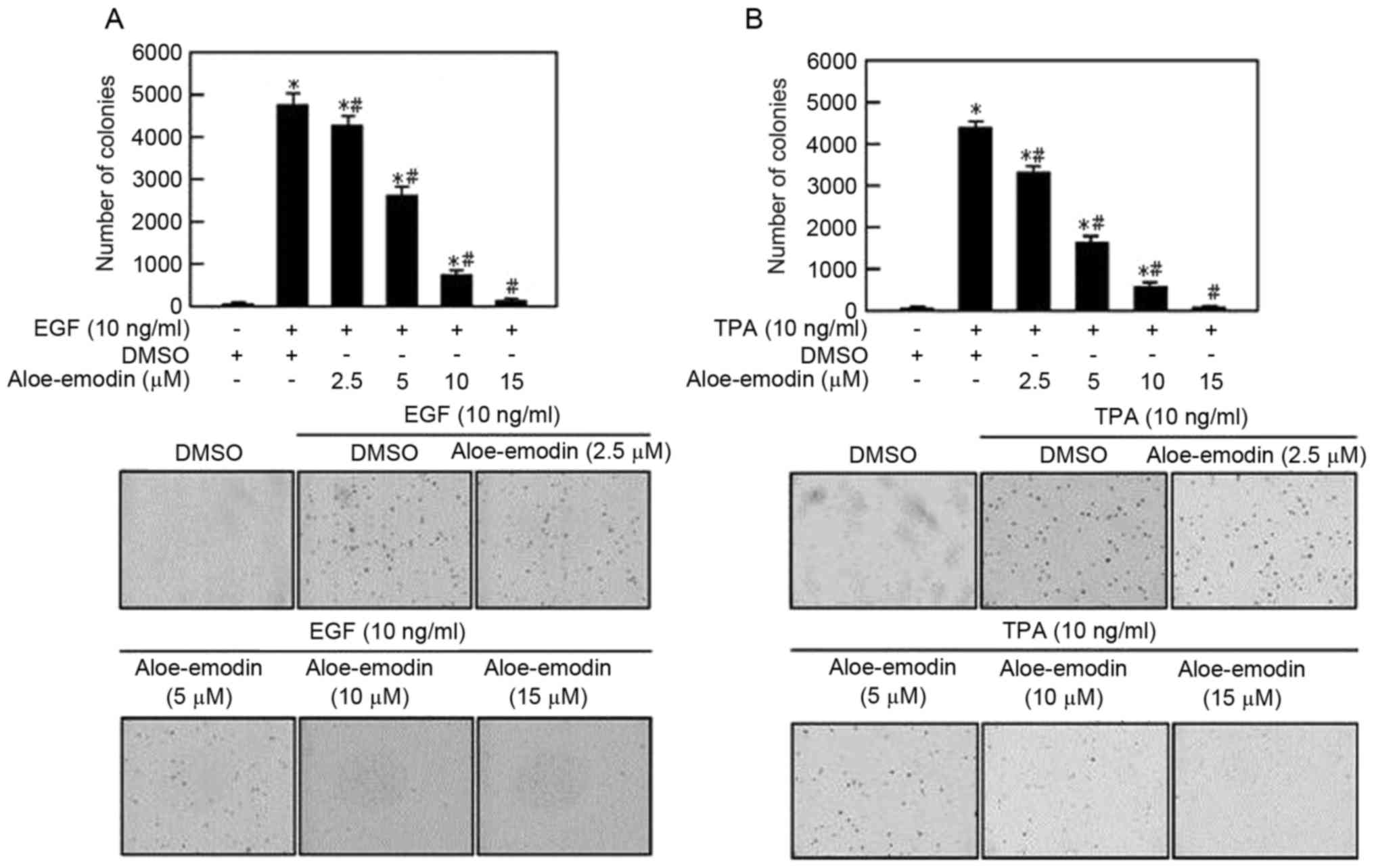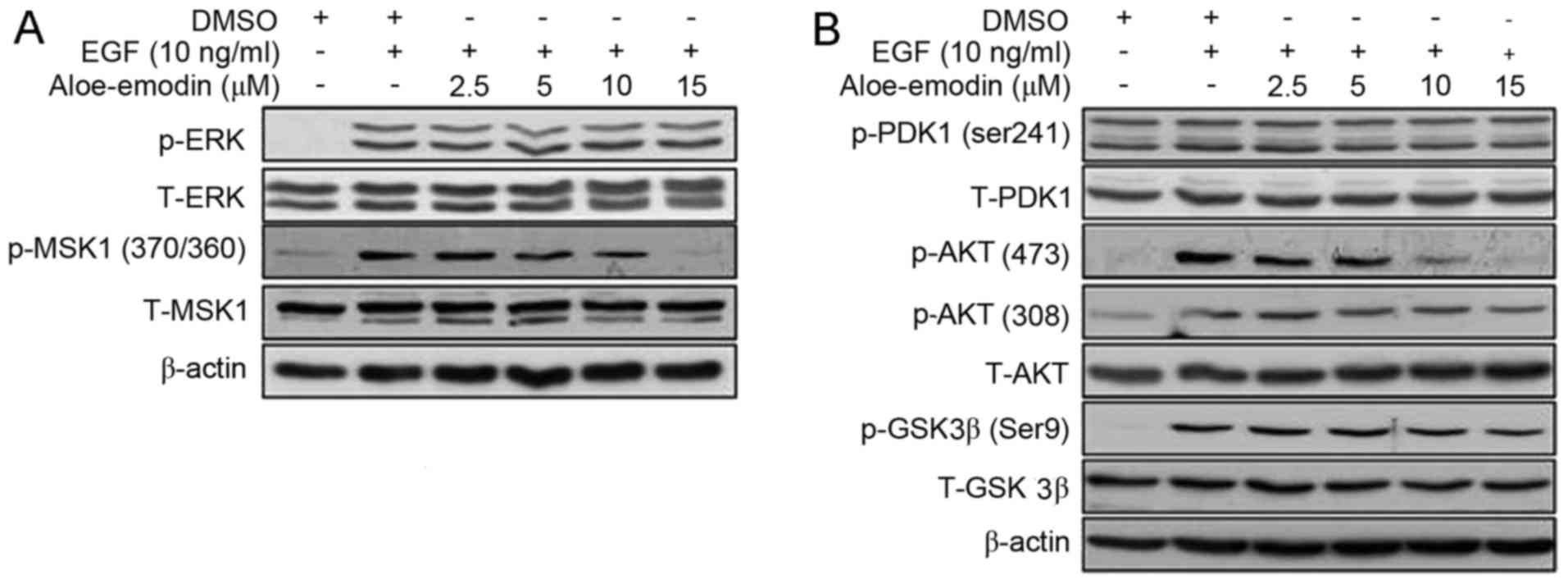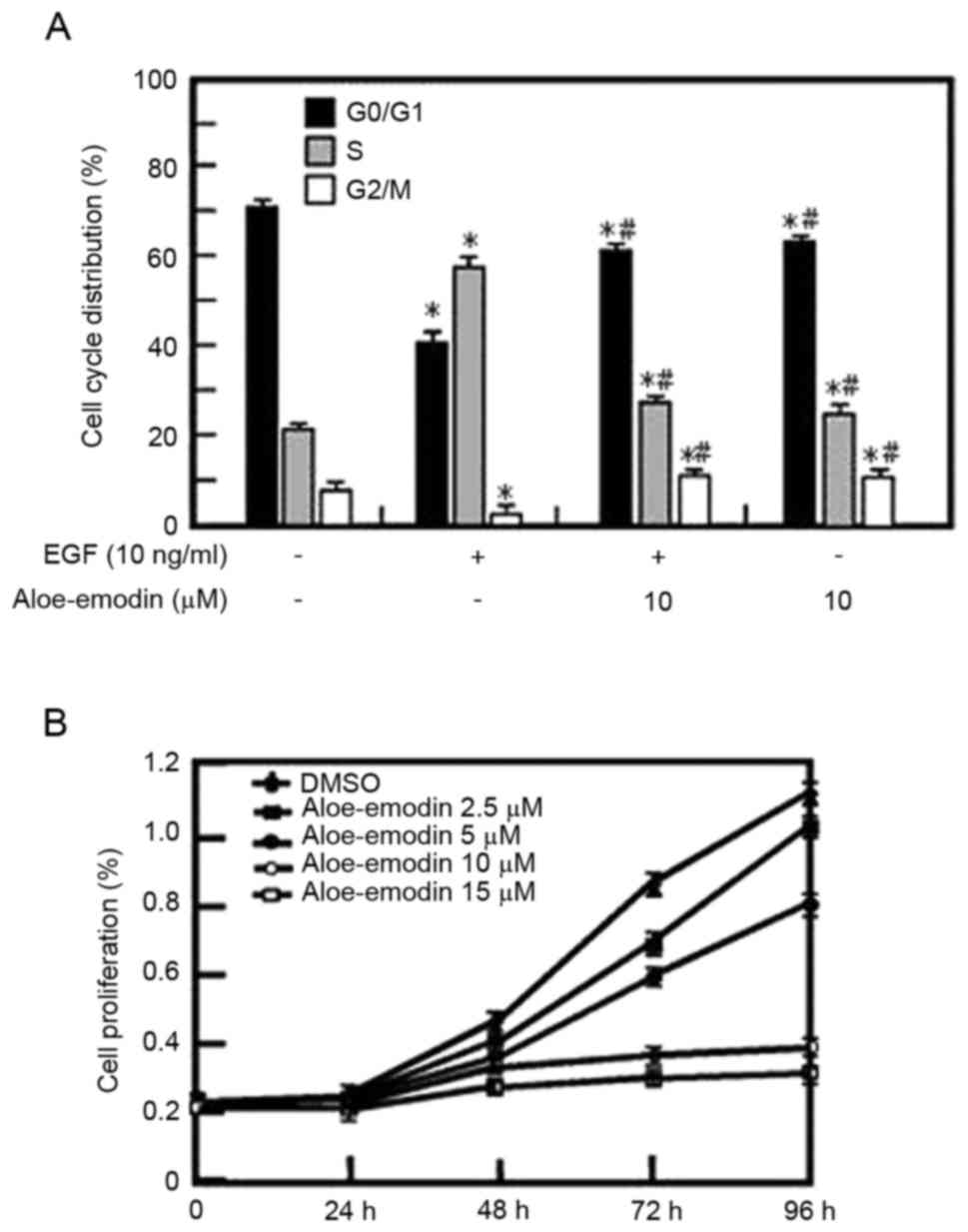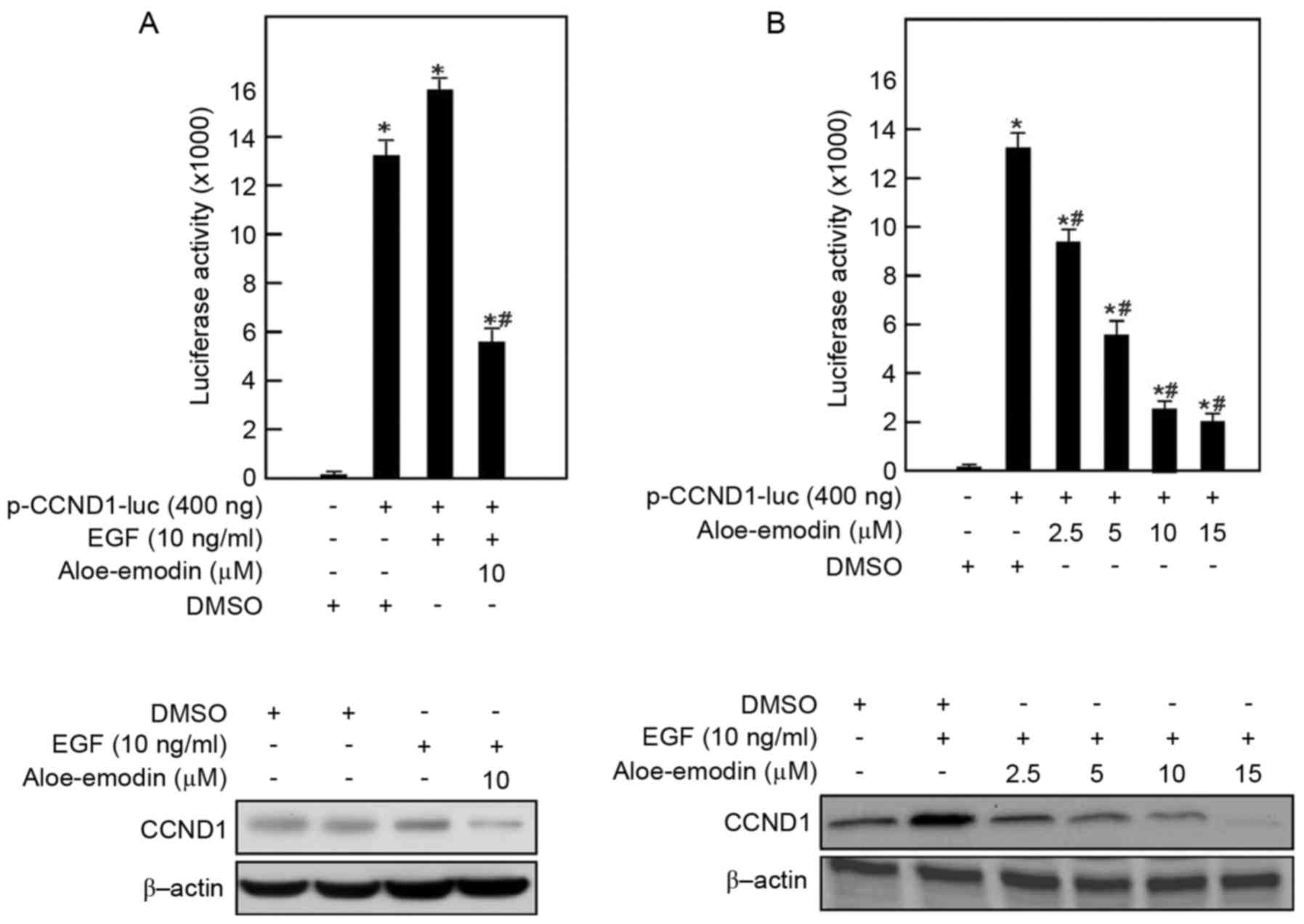|
1
|
Yewale C, Baradia D, Vhora I, Patil S and
Misra A: Epidermal growth factor receptor targeting in cancer: A
review of trends and strategies. Biomaterials. 34:8690–8707. 2013.
View Article : Google Scholar : PubMed/NCBI
|
|
2
|
Mitsudomi T and Yatabe Y: Epidermal growth
factor receptor in relation to tumor development: EGFR gene and
cancer. Febs J. 277:301–308. 2010. View Article : Google Scholar : PubMed/NCBI
|
|
3
|
Drobic B, Espino PS and Davie JR: Mitogen-
and stress-activated protein kinase 1 activity and histone h3
phosphorylation in oncogene-transformed mouse fibroblasts. Cancer
Res. 64:9076–9079. 2004. View Article : Google Scholar : PubMed/NCBI
|
|
4
|
Vermeulen L, Vanden Berghe W, Beck IM,
Bosscher K and Haegeman G: The versatile role of MSKs in
transcriptional regulation. Trends Biochem Sci. 34:311–318. 2009.
View Article : Google Scholar : PubMed/NCBI
|
|
5
|
Seshacharyulu P, Ponnusamy MP, Haridas D,
Jain M, Ganti AK and Batra SK: Targeting the EGFR signaling pathway
in cancer therapy. Expert Opin Ther Targets. 16:15–31. 2012.
View Article : Google Scholar : PubMed/NCBI
|
|
6
|
Chang S, Iversen L, Kragballe K, Arthur JS
and Johansen C: Mice lacking MSK1 and MSK2 show reduced skin tumor
development in a two-stage chemical carcinogenesis model. Cancer
Invest. 29:240–245. 2011. View Article : Google Scholar : PubMed/NCBI
|
|
7
|
Pérez-Cadahía B, Drobic B, Espino PS, He
S, Mandal S, Healy S and Davie JR: Role of MSK1 in the malignant
phenotype of Ras-transformed mouse fibroblasts. J Biol Chem.
286:42–49. 2011. View Article : Google Scholar : PubMed/NCBI
|
|
8
|
Liu K, Park C, Li S, Lee KW, Liu H, He L,
Soung NK, Ahn JS, Bode AM, Dong Z, et al: Aloe emodin suppresses
prostate cancer by targeting the mTOR complex 2. Carcinogenesis.
33:1406–1411. 2012. View Article : Google Scholar : PubMed/NCBI
|
|
9
|
Chen XL, Ren KH, He HW and Shao RG:
Involvement of PI3K/AKT/GSK3beta pathway in tetrandrine-induced G1
arrest and apoptosis. Cancer Biol Ther. 7:1073–1078. 2008.
View Article : Google Scholar : PubMed/NCBI
|
|
10
|
Vermeulen K, Van Bockstaele DR and
Berneman ZN: The cell cycle: A review of regulation, deregulation
and therapeutic targets in cancer. Cell Prolif. 36:131–149. 2003.
View Article : Google Scholar : PubMed/NCBI
|
|
11
|
Chen MJ, Cheng AC, Lee MF and Hsu YC:
Simvastatin induces G1 arrest by up-regulating GSK3beta and
down-regulating CDK4/cyclin D1 and CDK2/cyclin E1 in human primary
colorectal cancer cells. J Cell Physiol. Aug 18–2017.doi:
10.1002/jcp.26156 (Epub ahead of print).
|
|
12
|
Sutherland RL and Musgrove EA: Cyclin D1
and mammary carcinoma: New insights from transgenic mouse models.
Breast Cancer Res. 4:14–17. 2002. View
Article : Google Scholar : PubMed/NCBI
|
|
13
|
Pecere T, Sarinella F, Salata C, Gatto B,
Bet A, Dalla Vecchia F, Diaspro A, Carli M, Palumbo M and Palù G:
Involvement of p53 in specific anti-neuroectodermal tumor activity
of aloe emodin. Int J Cancer. 10:836–847. 2003. View Article : Google Scholar
|
|
14
|
Knudsen KE, Diehl JA, Haiman CA and
Knudsen ES: Cyclin D1: polymorphism, aberrant splicing and cancer
risk. Oncogene. 25:1620–1628. 2006. View Article : Google Scholar : PubMed/NCBI
|
|
15
|
Hao L and ElShamy WM: BRCA1-IRIS activates
cyclin D1 expression in breast cancer cells by downregulating the
JNK phosphatase DUSP3/VHR. Int J Cancer. 121:39–46. 2007.
View Article : Google Scholar : PubMed/NCBI
|
|
16
|
Deharvengt SJ, Gunn JR, Pickett SB and
Korc M: Intratumoral delivery of shRNA targeting cyclin D1
attenuates pancreatic cancer growth. Cancer Gene Ther. 17:325–333.
2010. View Article : Google Scholar : PubMed/NCBI
|
|
17
|
Chen R, Zhang J, Hu Y, Wang S, Chen M and
Wang Y: Potential antineoplastic effects of Aloe-emodin: A
comprehensive review. Am J Chin Med. 42:275–288. 2014. View Article : Google Scholar : PubMed/NCBI
|
|
18
|
Woo SW, Nan JX, Lee SH, Park EJ, Zhao YZ
and Sohn DH: Aloe emodin suppresses myofibroblastic differentiation
of rat hepatic stellate cells in primary culture. Pharmacol
Toxicol. 90:193–198. 2002. View Article : Google Scholar : PubMed/NCBI
|
|
19
|
Chiu TH, Lai WW, Hsia TC, Yang JS, Lai TY,
Wu PP, Ma CY, Yeh CC, Ho CC, Lu HF, et al: Aloe-emodin induces cell
death through S-phase arrest and caspase-dependent pathways in
human tongue squamous cancer SCC-4 cells. Anticancer Res.
29:4503–4511. 2009.PubMed/NCBI
|
|
20
|
Huang PH, Huang CY, Chen MC, Lee YT, Yue
CH, Wang HY and Lin H: Emodin and aloe-emodin suppress breast
cancer cell proliferation through ER α inhibition. Evid Based
Complement Alternat Med. 2013:3761232013. View Article : Google Scholar : PubMed/NCBI
|
|
21
|
Guo J, Xiao B, Zhang S, Liu D, Liao Y and
Sun Q: Growth inhibitory effects of gastric cancer cells with an
increase in S phase and alkaline phosphatase activity repression by
aloe emodin. Cancer Biol Ther. 6:85–88. 2007. View Article : Google Scholar : PubMed/NCBI
|
|
22
|
Kang SC, Lee CM, Choung ES, Bak JP, Bae
JJ, Yoo HS, Kwak JH and Zee OP: Anti-proliferative effects of
estrogen receptor-modulating compounds isolated from Rheum
palmatum. Arch Pharm Res. 31:722–726. 2008. View Article : Google Scholar : PubMed/NCBI
|
|
23
|
Lee CJ, Lee MH, Yoo SM, Choi KI, Song JH,
Jang JH, Oh SR, Ryu HW, Lee HS, Surh YJ and Cho YY: Magnolin
inhibits cell migration and invasion by targeting the ERKs/RSK2
signaling pathway. BMC Cancer. 15:5762013. View Article : Google Scholar
|
|
24
|
Zhang Q, Yan HB, Wang J, Cui SJ, Wang XQ,
Jiang YH, Feng L, Yang PY and Liu F: Chromatin remodeling gene
AT-rich interactive domain-containing protein 1A suppresses gastric
cancer cell proliferation by targeting PIK3CA and PDK1. Oncotarget.
7:46127–46141. 2016.PubMed/NCBI
|
|
25
|
Vadlakonda L, Pasupuleti M and Pallu R:
Role of PI3K-AKT-mTOR and Wnt signaling pathways in transition of
G1-S phase of cell cycle in cancer cells. Front Oncol. 3:852013.
View Article : Google Scholar : PubMed/NCBI
|
|
26
|
Hinz M, Krappmann D, Eichten A, Heder A,
Scheidereit C and Strauss M: NF-kappaB function in growth control:
Regulation of cyclin D1 expression and G0/G1-to-S-phase transition.
Mol Cell Biol. 19:2690–2698. 1999. View Article : Google Scholar : PubMed/NCBI
|
|
27
|
Lai SS, Zhao DD, Cao P, Lu K, Luo OY, Chen
WB, Liu J, Jiang EZ, Yu ZH, Lee G, et al: PP2Acα positively
regulates the termination of liverregeneration in mice through the
AKT/GSK3β/Cyclin D1pathway. J Hepatol. 64:352–360. 2012. View Article : Google Scholar
|


















